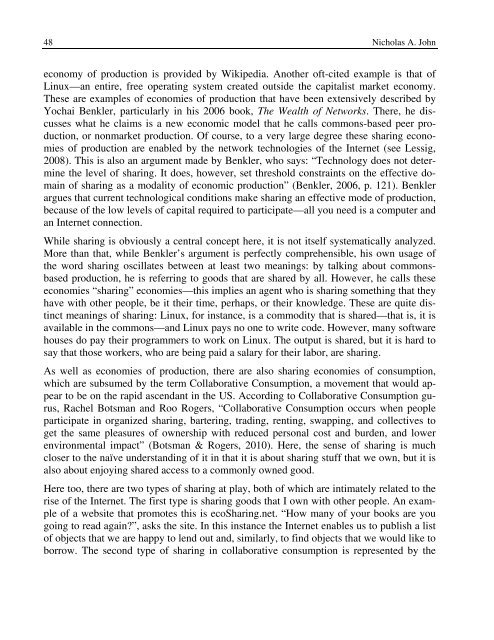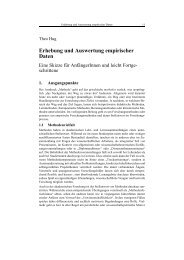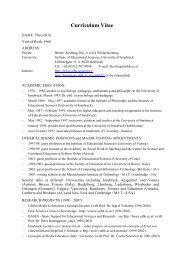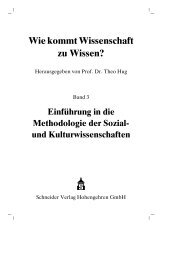Cultures and Ethics of Sharing - Universität Innsbruck
Cultures and Ethics of Sharing - Universität Innsbruck
Cultures and Ethics of Sharing - Universität Innsbruck
- Keine Tags gefunden...
Sie wollen auch ein ePaper? Erhöhen Sie die Reichweite Ihrer Titel.
YUMPU macht aus Druck-PDFs automatisch weboptimierte ePaper, die Google liebt.
48 Nicholas A. Johneconomy <strong>of</strong> production is provided by Wikipedia. Another <strong>of</strong>t-cited example is that <strong>of</strong>Linux—an entire, free operating system created outside the capitalist market economy.These are examples <strong>of</strong> economies <strong>of</strong> production that have been extensively described byYochai Benkler, particularly in his 2006 book, The Wealth <strong>of</strong> Networks. There, he discusseswhat he claims is a new economic model that he calls commons-based peer production,or nonmarket production. Of course, to a very large degree these sharing economies<strong>of</strong> production are enabled by the network technologies <strong>of</strong> the Internet (see Lessig,2008). This is also an argument made by Benkler, who says: “Technology does not determinethe level <strong>of</strong> sharing. It does, however, set threshold constraints on the effective domain<strong>of</strong> sharing as a modality <strong>of</strong> economic production” (Benkler, 2006, p. 121). Benklerargues that current technological conditions make sharing an effective mode <strong>of</strong> production,because <strong>of</strong> the low levels <strong>of</strong> capital required to participate—all you need is a computer <strong>and</strong>an Internet connection.While sharing is obviously a central concept here, it is not itself systematically analyzed.More than that, while Benkler’s argument is perfectly comprehensible, his own usage <strong>of</strong>the word sharing oscillates between at least two meanings: by talking about commonsbasedproduction, he is referring to goods that are shared by all. However, he calls theseeconomies “sharing” economies—this implies an agent who is sharing something that theyhave with other people, be it their time, perhaps, or their knowledge. These are quite distinctmeanings <strong>of</strong> sharing: Linux, for instance, is a commodity that is shared—that is, it isavailable in the commons—<strong>and</strong> Linux pays no one to write code. However, many s<strong>of</strong>twarehouses do pay their programmers to work on Linux. The output is shared, but it is hard tosay that those workers, who are being paid a salary for their labor, are sharing.As well as economies <strong>of</strong> production, there are also sharing economies <strong>of</strong> consumption,which are subsumed by the term Collaborative Consumption, a movement that would appearto be on the rapid ascendant in the US. According to Collaborative Consumption gurus,Rachel Botsman <strong>and</strong> Roo Rogers, “Collaborative Consumption occurs when peopleparticipate in organized sharing, bartering, trading, renting, swapping, <strong>and</strong> collectives toget the same pleasures <strong>of</strong> ownership with reduced personal cost <strong>and</strong> burden, <strong>and</strong> lowerenvironmental impact” (Botsman & Rogers, 2010). Here, the sense <strong>of</strong> sharing is muchcloser to the naïve underst<strong>and</strong>ing <strong>of</strong> it in that it is about sharing stuff that we own, but it isalso about enjoying shared access to a commonly owned good.Here too, there are two types <strong>of</strong> sharing at play, both <strong>of</strong> which are intimately related to therise <strong>of</strong> the Internet. The first type is sharing goods that I own with other people. An example<strong>of</strong> a website that promotes this is eco<strong>Sharing</strong>.net. “How many <strong>of</strong> your books are yougoing to read again?”, asks the site. In this instance the Internet enables us to publish a list<strong>of</strong> objects that we are happy to lend out <strong>and</strong>, similarly, to find objects that we would like toborrow. The second type <strong>of</strong> sharing in collaborative consumption is represented by the








